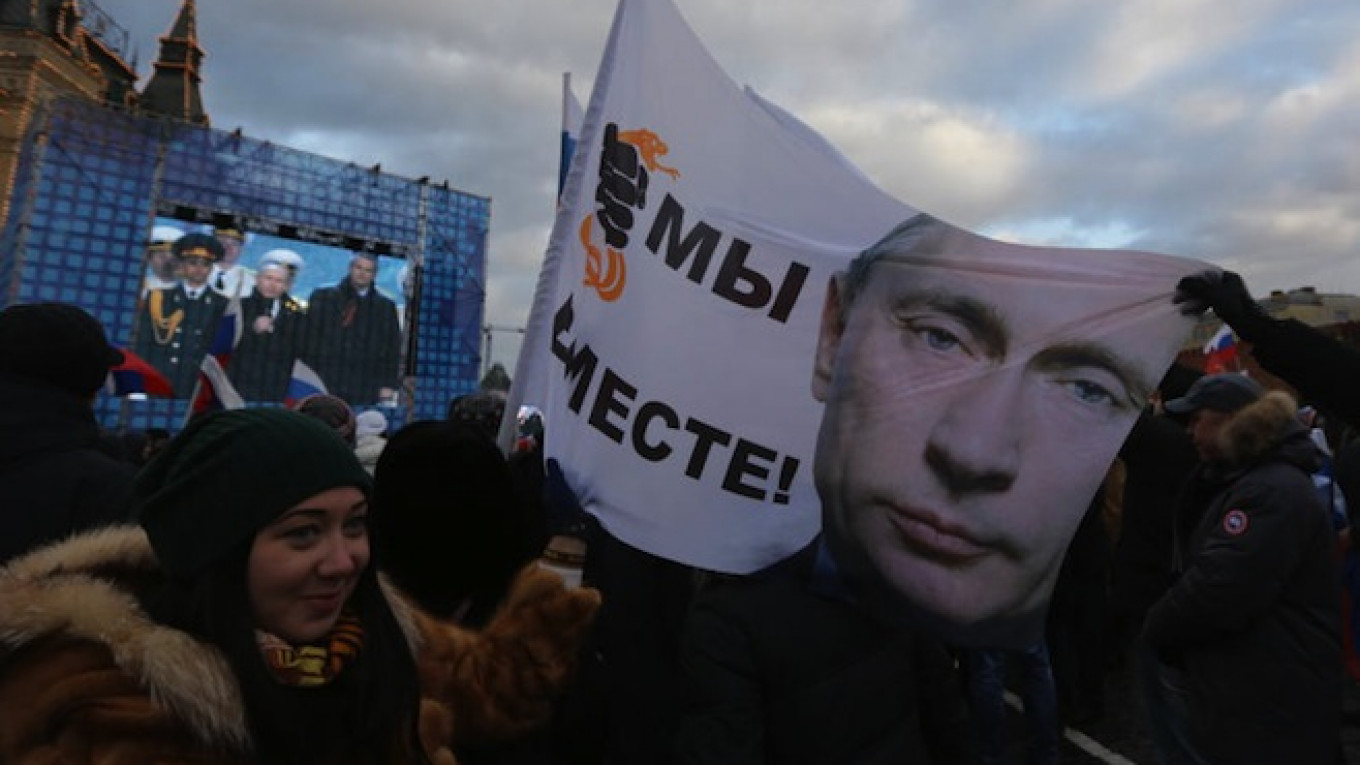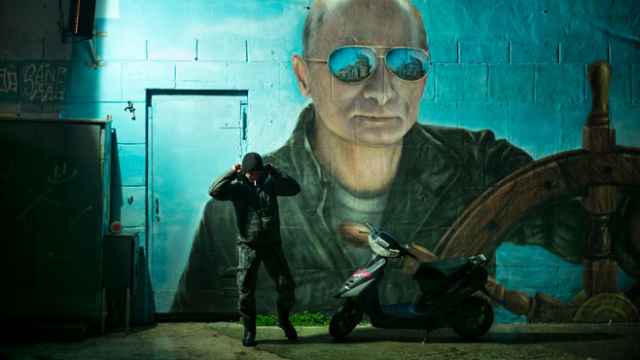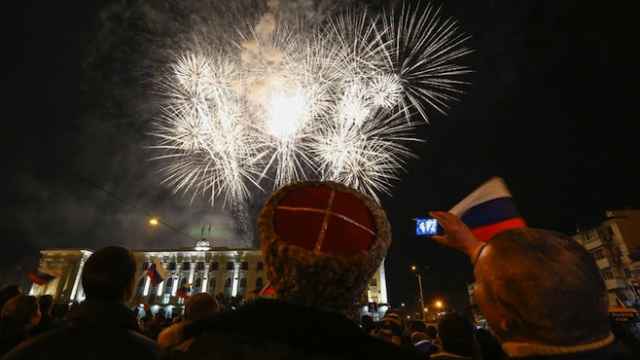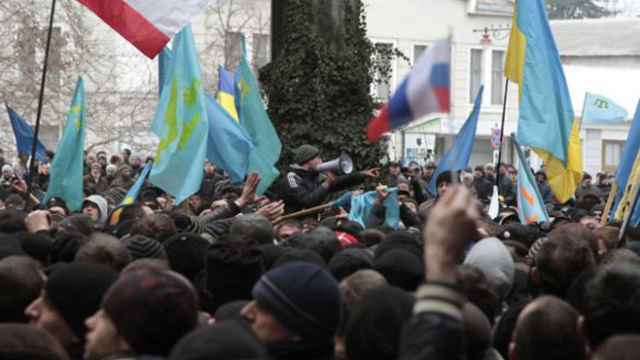As Russian authorities gear up to celebrate the two-year anniversary of the “inevitable” annexation of Crimea, participants in commemoration rallies are being hired and, according to some accounts, coerced to attend.
“In modern Russia, and not only in Russia, there is solid recognition that Crimea's return to Russia was historically inevitable and morally just,” State Duma Speaker Sergei Naryshkin was reported as saying by the TASS news agency on Friday.
“There should be absolute respect for the will of the Crimean people and the decision that was made two years ago,” Kremlin spokesman Dmitry Peskov said, the RIA Novosti news agency reported Friday.
But media reports say that colleges around Russia have been urging — or ordering — their students to attend rallies cheering the annexation.
A memo circulated at Moscow's Russian State Social University said at least 150 students needed to sign up for a Friday rally, the independent Novaya Gazeta newspaper reported Thursday.
“We are marching in the first presidential column,” the memo, signed by the freshman class president, added, the report said.
Showing up was “mandatory,” a senior student at the college, whose class also received similar memos, was quoted by Novaya Gazeta as saying.
The freshman class president denied accusations that all students were required to show up, saying rally attendance was mandatory only for those who missed other “events” or practice sessions, and offered a way to “cover at least some hours,” Novaya Gazeta reported.
An online forum dedicated to hiring movie extras, Massovki.ru posted an advertisement this week offering 300 rubles (about $4.50) for marching in a Friday rally in central Moscow “in honor of the unification with Crimea.” The gig appeared to have been popular — after a number of forum users pledged to attend and listed their contact information, the post was updated to read: “Registration finished.”
But another advertisement on the same website was still offering 500 rubles early Friday for people willing to participate as audience members at an evening show celebrating the annexation.
In St. Petersburg the State University of Information Technologies, Mechanics and Optics reportedly received a “quota,” requiring it to provide at least 150 students for a rally this week celebrating the Crimea annexation, according to the city's Telegraph news portal.
A rally organizer said on social networks that the quota meant about a dozen students from each ITMO department, but “if some departments can't manage, leaders are personally asking others [to contribute],” according to a post cited by Telegraph.
A deputy law school dean at Moscow's Social University, Maria Mayorova, said the urgings to participate in the Friday rally were merely an “invitation,” and students would not face any penalties for declining to attend, Novaya Gazeta reported.
“We are a federal university, and sometimes we receive requests and invitations to participate in Moscow events,” she was quoted as saying. “Like all federal universities, we are always glad to accept such invitations.”
Students and workers were routinely called up to march in state-organized demonstrations during the Soviet era. Gennady Zyuganov, leader of the Russian Communist Party, told the Komsomolskaya Pravda newspaper on Thursday, “I'm sure [the annexation] is a step towards the restoration of the [Soviet] Union that was torn down. We must pay tribute to the residents of Crimea – to worship and thank them.”
In the decade or so following the 1991 Soviet collapse, Russians predominantly rallied when they sought to protest a government policy or put forward political or economic demands.
Since Russian President Vladimir Putin first took power in 2000, public shows of support for the Kremlin have gained significance as a sign of patriotism — and as a condition of career advancement.
Requiring citizens to show up en masse for official rallies has reportedly become a widespread practice in the Russian republic of Chechnya, where students and government employees are routinely bussed to demonstrations and handed signs that praise Putin or Chechen leader Ramzan Kadyrov, according to participant testimonies cited by Russian independent media.
Chechnya is also renowned for its voter activity records. Ahead of a 2008 balloting, Kadyrov predicted that voter “turnout will reach at least 100 percent, and maybe even a higher percentage,” the RIA Novosti news agency reported at the time.
Contact the author at newsreporter@imedia.ru
A Message from The Moscow Times:
Dear readers,
We are facing unprecedented challenges. Russia's Prosecutor General's Office has designated The Moscow Times as an "undesirable" organization, criminalizing our work and putting our staff at risk of prosecution. This follows our earlier unjust labeling as a "foreign agent."
These actions are direct attempts to silence independent journalism in Russia. The authorities claim our work "discredits the decisions of the Russian leadership." We see things differently: we strive to provide accurate, unbiased reporting on Russia.
We, the journalists of The Moscow Times, refuse to be silenced. But to continue our work, we need your help.
Your support, no matter how small, makes a world of difference. If you can, please support us monthly starting from just $2. It's quick to set up, and every contribution makes a significant impact.
By supporting The Moscow Times, you're defending open, independent journalism in the face of repression. Thank you for standing with us.
Remind me later.






